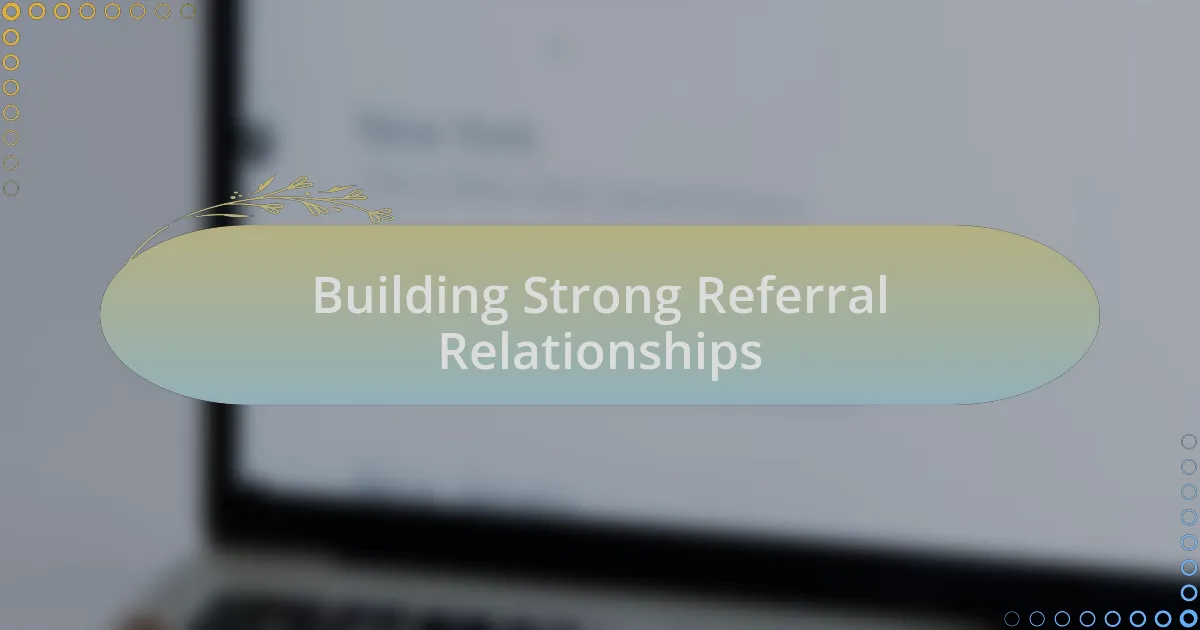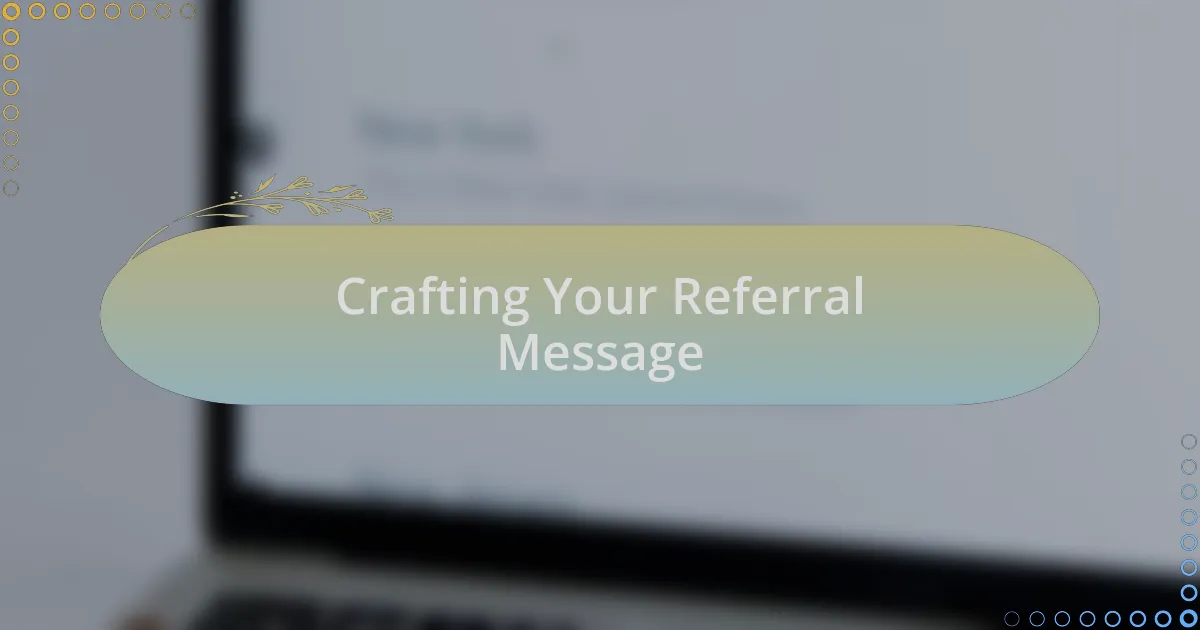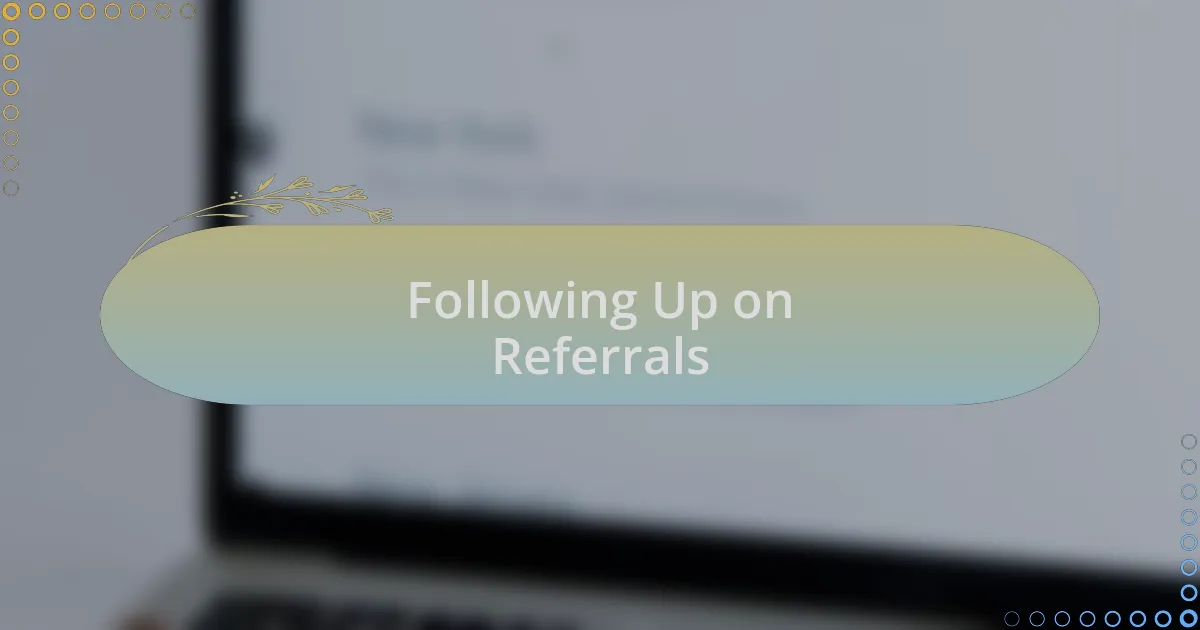Key takeaways:
- Local business networking fosters genuine relationships, leading to unexpected opportunities and collaborations.
- Building strong referral relationships relies on trust, communication, and shared goals among partners.
- Effective referrals require identifying complementary partners, providing excellent service, and expressing gratitude to strengthen connections.
- Following up on referrals is crucial; timely and personalized follow-ups can enhance engagement and trustworthiness.

Understanding Local Business Networking
Local business networking is more than just exchanging business cards; it’s about building genuine relationships. I remember my first networking event—initially daunting, I quickly realized that these interactions were based on trust and shared goals. Isn’t it fascinating how one meaningful conversation can lead to opportunities you never expected?
When you engage in local business networking, you’re tapping into a community that can support your growth. I’ve often found that collaborations come from simple chats; perhaps a coffee break can spark a partnership. Have you ever considered how your local connections can amplify your reach?
Understanding the dynamics of local networking means recognizing that everyone brings unique strengths to the table. During one event, a fellow entrepreneur shared a resource that completely transformed my marketing approach. Isn’t it incredible how knowledge can flow through these networks, enriching everyone involved?

Benefits of Local Business Networking
Local business networking offers significant advantages that go beyond mere connections. I once joined a local chamber of commerce, and to my surprise, the relationships I built there led to referrals that doubled my client base in just a year. Have you ever thought about how a single trusted referral can dramatically impact your business?
Being part of a local network fosters a sense of community and support. When I faced a challenging project, it was my local network that rallied around me, offering advice and resources that I had never considered. Isn’t it reassuring to know that there’s a group of people rooting for your success?
Another key benefit is the chance to learn from others’ experiences. Attending a workshop led by a fellow entrepreneur opened my eyes to strategies I had overlooked, and I realized how these shared insights can lead to personal and professional growth. How often do we take the time to learn from the remarkable journeys of those around us?

Building Strong Referral Relationships
Building strong referral relationships is about nurturing trust and mutual support. I remember one particular collaboration where a fellow business owner and I dedicated time to understand each other’s services deeply. This understanding allowed us to confidently refer clients to one another, knowing we were offering added value. Have you ever considered how genuine interest in someone else’s business can lead to fruitful referrals?
In my experience, consistent communication plays a pivotal role. I make it a point to check in with my referral partners regularly, sharing updates and celebrating each other’s wins. This not only keeps the relationship warm but also reinforces our commitment to supporting one another. How often do we pause to acknowledge the efforts of those who help us grow?
Lastly, creating shared goals can significantly enhance the strength of these relationships. I once facilitated a joint marketing event with a referral partner, which not only expanded our reach but also solidified our alliance. Seeing both our businesses thrive from this collaboration was incredibly satisfying. Have you thought about how joint initiatives could benefit your connections?

Strategies for Effective Referrals
One key strategy I believe is identifying the right referral partners. Instead of casting a wide net, I’ve found it more effective to hone in on businesses that complement my own services. For instance, partnering with a local graphic designer allowed me to refer clients who needed visual branding work, while they directed clients my way for website services. Ponder this: how much stronger could your referrals be if you align your strengths with those who fill in the gaps?
Another approach I value is providing excellent service to the clients you refer. I recall a time when I took extra steps to ensure a smooth experience for a client referred to me by a networking friend. The feedback I received was overwhelmingly positive, leading my friend to trust me even more with their clients. Have you ever wondered how your efforts in nurturing those client relationships can ripple back to strengthen your referral network?
Lastly, I strongly advocate for expressing gratitude to your referral partners. A simple thank you can go a long way, demonstrating that you appreciate their trust in you. I make it a habit to send a handwritten note or even a small gift after a successful referral. It’s not just about the transaction; it’s about building a genuine rapport. How do you show gratitude to those who help elevate your business?

Crafting Your Referral Message
Crafting a compelling referral message starts with clarity. I remember when I crafted a message for a local bakery I admired; I focused on what set them apart— their organic ingredients and unique flavors. By highlighting these specific qualities, my message not only captured attention but also created a vivid image in the reader’s mind. Have you considered how your unique selling points could enhance the impact of your referrals?
I also believe that personal touches make a significant difference. When I refer a coach I know, I often share a brief story of how they helped me overcome challenges in my business. This storytelling element adds authenticity and encourages others to reach out. How powerful do you think your personal experiences could be in influencing someone’s decision to connect with the businesses you recommend?
Lastly, I make it a point to include a call to action in my referrals. This could be as simple as encouraging recipients to check out the business’s website or suggesting they call for a consultation. Once, I added a note urging a friend to reach out to a local plumber right away, as they had an urgent issue. That urgency prompted my friend to act quickly, resulting in a successful connection. Have you thought about how a well-crafted call to action could prompt immediate engagement in your referrals?

Following Up on Referrals
Following up on referrals is a critical step that many tend to overlook. I personally experienced this when I referred a local artist to a business contact. A week after my introduction, I reached out to see if they connected. It turned out they hadn’t, so I facilitated a quick nudge, reminding my contact of the artist’s unique skills. This simple follow-up not only helped solidify the introduction but also reinforced my trustworthiness in making the connection.
In my experience, the timing of follow-ups can significantly impact the outcome. I remember referring a home service provider during a networking event. After two weeks, I sent a quick email to the person I referred, asking if they had reached out. This timing was perfect; they hadn’t called yet, but my nudging prompted them to book an appointment. Isn’t it fascinating how a small gesture, like a follow-up, can reignite interest?
It’s essential to be mindful of how your follow-up is perceived. When I followed up with a referral to a digital marketing expert, I chose to share a brief success story from my own experience with them, expressing enthusiasm about how they transformed my online presence. This approach made my follow-up feel more personal and engaging. Have you considered how you might share your own successes to enhance follow-ups on your referrals?